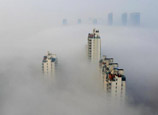
Unclear tendency
The Central Government began limiting home purchase in 2010 and continued to tight regulations in 2012.
According to the Green Book of the Housing Market released by the CASS on December 13, 2012, the government only curbed rapidly growing housing prices in 2012, but did not realize the optimal goal of making prices more reasonable. "The tendency that various indicators in the housing market have risen recently merits vigilance," says the green book.
It stressed that when housing prices in most cities rise moderately, local governments will relax their control and bring the risk of rapid price hikes once more if the Central Government does not implement effective control measures.
In those cities with real estate bubbles, the withdrawal of investment and speculators will cause the collapse of the market.
Across the country, the demand for improving housing conditions will grow stably in 2013, and growth in first-tier cities will be faster than in second- and third-tier areas, according to the green paper.
Ni Pengfei, Director of the Center for City and Competitiveness of the CASS and the green paper's chief editor, said local governments are still highly dependent on revenues from selling land.
In 2012 China's fiscal revenue totaled 10 trillion yuan ($1.59 trillion), of which more than 20 percent came from land sales. The Central Government's control of the real estate market has reduced fiscal revenues of local governments. Therefore they are increasingly motivated to rescue the real estate market and implementation of tighter macro-control policies has relaxed. This may also cause a rebound of the market.
However, many people take a gloomy view. Xia Bin, a researcher at the Development Research Center of the State Council, believes the Chinese economy will still try to balance stable growth and economic restructuring in 2013, therefore a rebound should not be expected.
According to Xia, the global economy is still gloomy and China's exports are facing heavy pressure. Moreover, the government-led investment pattern is unsustainable, so economic difficulties will continue to exist. Judging from present economic growth and the real estate market, macro-control policies are unlikely to stop.
Independent economist Xie Guozhong thinks a recent recovery in the real estate market is not a true rebound, but the beginning of another bubble. "Sell your empty houses as soon as possible," he writes in his blog.
Relax or tighten?
Real estate market control is sure to continue this year and it's unlikely to be relaxed, but will it be further tightened?
Ni said that control policies of the market will face difficulties in 2013.
First, recovery in the global economy is slow, which is not good for China's exports. Since many countries chose to ease their monetary policies, China faces growing potential of imported inflation. Moreover, international speculative capital is casting its greedy eyes on China's real estate market.
Second, domestic economy lacks growth momentum. Except for government investment, consumption and private investment are growing weakly. If external demand falls and growth in government investment is unsustainable, macroeconomic growth will become unstable, hence affecting the macro-control of the real estate market.
Third, local governments are short of money. Since different local governments face different conditions, it is hard to formulate a singular policy.
At the National Housing and Urban-Rural Construction Conference held in Beijing on December 25, 2012, Jiang Zengwei, Minister of Housing and Urban-Rural Construction, emphasized that differentiated housing loans, taxation policies and limits on home purchases will continue in 2013 in an effort to curb speculative home purchases.
The government will continue to build up an individual housing information system. Moreover, 6 million homes for low-income groups will be built.
Zhang said the Chinese economy is now experiencing restructuring and economic growth is slowing down, hence it is unlikely for real estate regulations to change. During the country's leadership transition in particular, regulations should be stable. To maintain stability, administrative measures such as limits on home purchases and housing loans will unlikely be relaxed in the short run.

















 The strongest left-behind children: 9-year-old girl holds up a family
The strongest left-behind children: 9-year-old girl holds up a family


![]()
